八年级上英语|Unit 1 How often do you exercise?|学案
文档属性
| 名称 | 八年级上英语|Unit 1 How often do you exercise?|学案 | 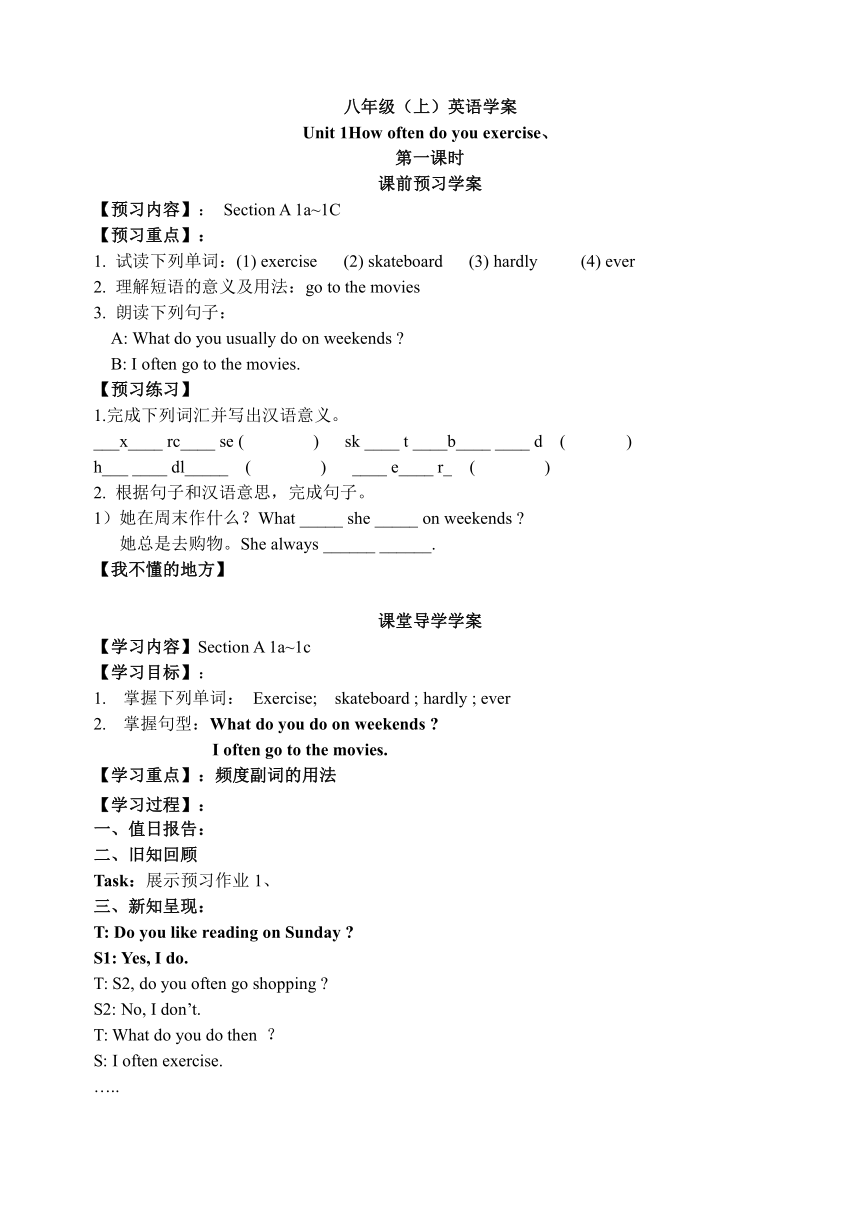 | |
| 格式 | rar | ||
| 文件大小 | 14.2KB | ||
| 资源类型 | 教案 | ||
| 版本资源 | 人教新目标(Go for it)版 | ||
| 科目 | 英语 | ||
| 更新时间 | 2010-12-07 22:47:00 | ||
图片预览

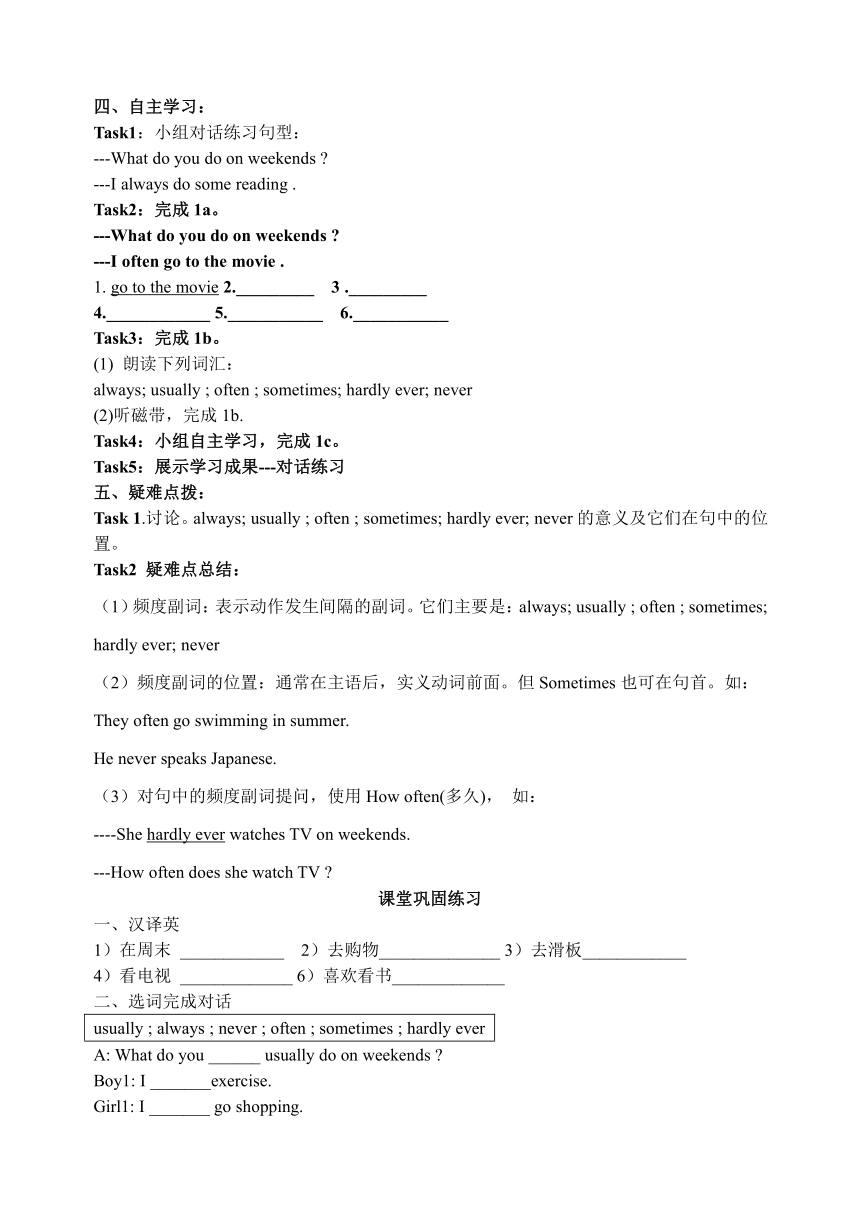
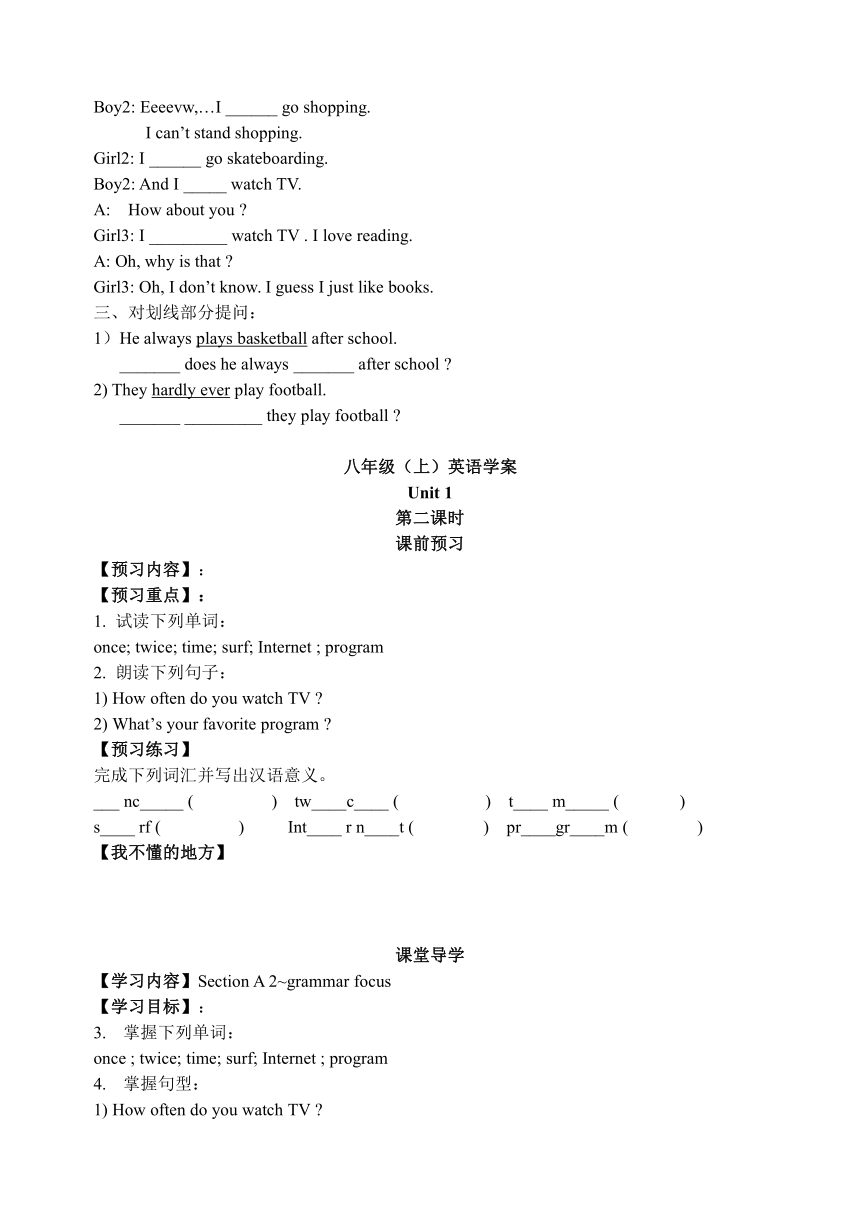
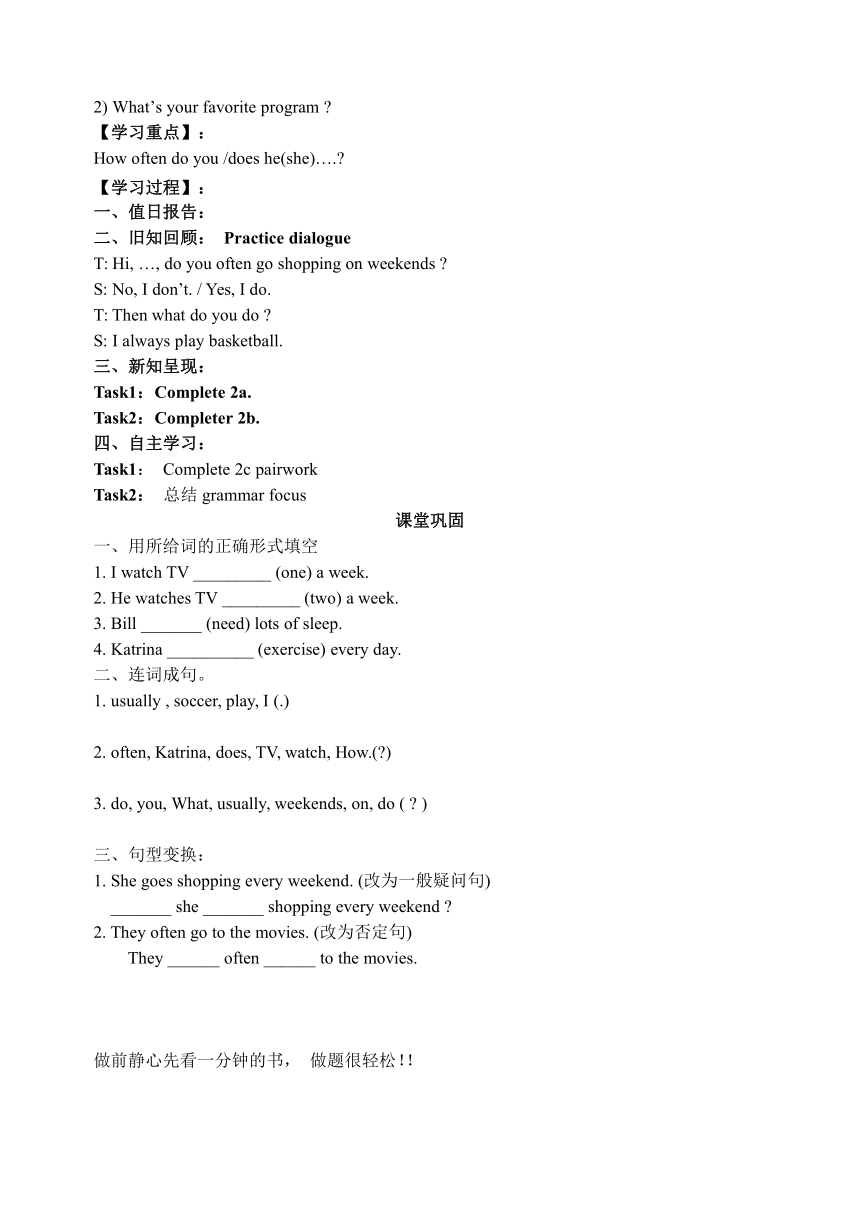
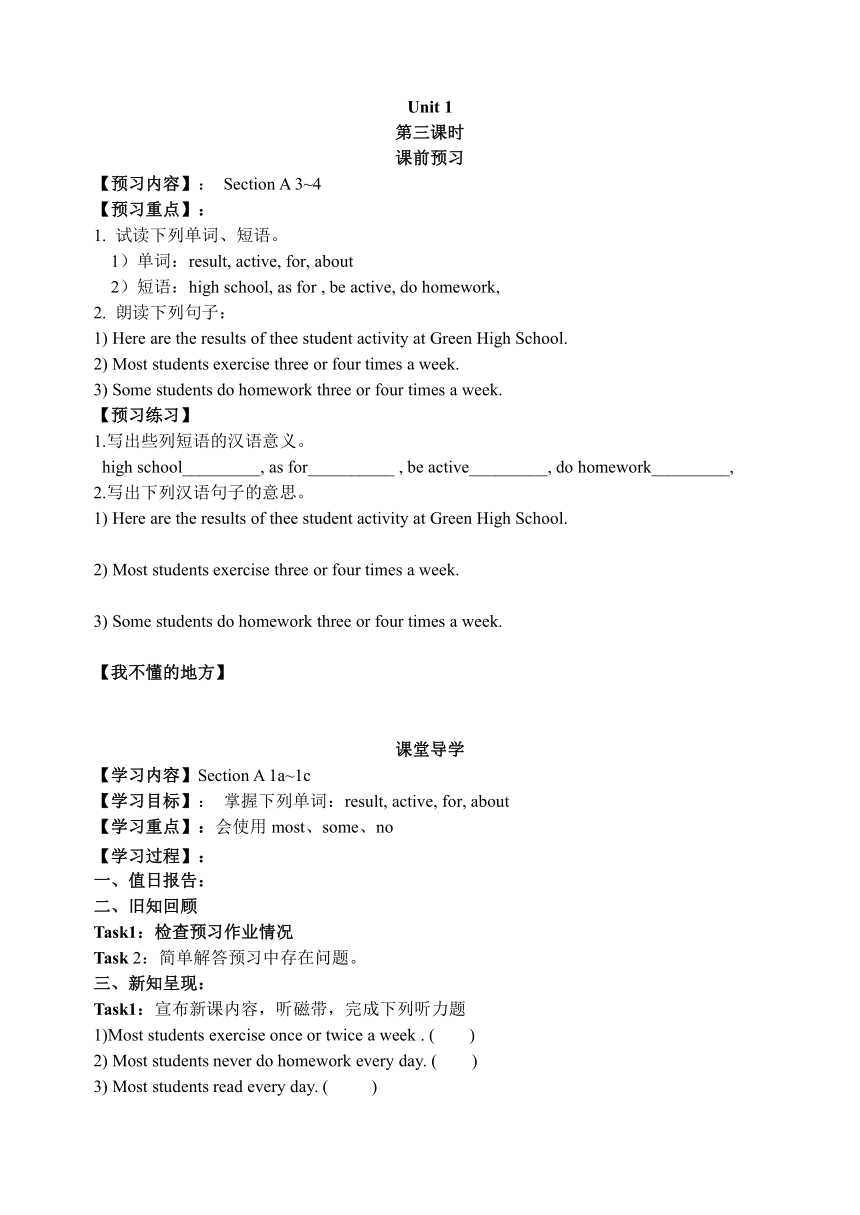
文档简介
八年级(上)英语学案
Unit 1How often do you exercise、
第一课时
课前预习学案
【预习内容】: Section A 1a~1C
【预习重点】:
1. 试读下列单词:(1) exercise (2) skateboard (3) hardly (4) ever
2. 理解短语的意义及用法:go to the movies
3. 朗读下列句子:
A: What do you usually do on weekends
B: I often go to the movies.
【预习练习】
1.完成下列词汇并写出汉语意义。
___x____ rc____ se ( ) sk ____ t ____b____ ____ d ( )
h___ ____ dl_____ ( ) ____ e____ r_ ( )
2. 根据句子和汉语意思,完成句子。
1)她在周末作什么?What _____ she _____ on weekends
她总是去购物。She always ______ ______.
【我不懂的地方】
课堂导学学案
【学习内容】Section A 1a~1c
【学习目标】:
1. 掌握下列单词: Exercise; skateboard ; hardly ; ever
2. 掌握句型:What do you do on weekends
I often go to the movies.
【学习重点】:频度副词的用法
【学习过程】:
一、值日报告:
二、旧知回顾
Task:展示预习作业1、
三、新知呈现:
T: Do you like reading on Sunday
S1: Yes, I do.
T: S2, do you often go shopping
S2: No, I don’t.
T: What do you do then ?
S: I often exercise.
…..
四、自主学习:
Task1:小组对话练习句型:
---What do you do on weekends
---I always do some reading .
Task2:完成1a。
---What do you do on weekends
---I often go to the movie .
1. go to the movie 2._________ 3 ._________
4.____________ 5.___________ 6.___________
Task3:完成1b。
(1) 朗读下列词汇:
always; usually ; often ; sometimes; hardly ever; never
(2)听磁带,完成1b.
Task4:小组自主学习,完成1c。
Task5:展示学习成果---对话练习
五、疑难点拨:
Task 1.讨论。always; usually ; often ; sometimes; hardly ever; never的意义及它们在句中的位置。
Task2 疑难点总结:
(1)频度副词:表示动作发生间隔的副词。它们主要是:always; usually ; often ; sometimes; hardly ever; never
(2)频度副词的位置:通常在主语后,实义动词前面。但Sometimes也可在句首。如:
They often go swimming in summer.
He never speaks Japanese.
(3)对句中的频度副词提问,使用How often(多久), 如:
----She hardly ever watches TV on weekends.
---How often does she watch TV
课堂巩固练习
一、汉译英
1)在周末 ____________ 2)去购物______________ 3)去滑板____________
4)看电视 _____________ 6)喜欢看书_____________
二、选词完成对话
usually ; always ; never ; often ; sometimes ; hardly ever
A: What do you ______ usually do on weekends
Boy1: I _______exercise.
Girl1: I _______ go shopping.
Boy2: Eeeevw,…I ______ go shopping.
I can’t stand shopping.
Girl2: I ______ go skateboarding.
Boy2: And I _____ watch TV.
A: How about you
Girl3: I _________ watch TV . I love reading.
A: Oh, why is that
Girl3: Oh, I don’t know. I guess I just like books.
三、对划线部分提问:
1)He always plays basketball after school.
_______ does he always _______ after school
2) They hardly ever play football.
_______ _________ they play football
八年级(上)英语学案
Unit 1
第二课时
课前预习
【预习内容】:
【预习重点】:
1. 试读下列单词:
once; twice; time; surf; Internet ; program
2. 朗读下列句子:
1) How often do you watch TV
2) What’s your favorite program
【预习练习】
完成下列词汇并写出汉语意义。
___ nc_____ ( ) tw____c____ ( ) t____ m_____ ( )
s____ rf ( ) Int____ r n____t ( ) pr____gr____m ( )
【我不懂的地方】
课堂导学
【学习内容】Section A 2~grammar focus
【学习目标】:
3. 掌握下列单词:
once ; twice; time; surf; Internet ; program
4. 掌握句型:
1) How often do you watch TV
2) What’s your favorite program
【学习重点】:
How often do you /does he(she)….
【学习过程】:
一、值日报告:
二、旧知回顾: Practice dialogue
T: Hi, …, do you often go shopping on weekends
S: No, I don’t. / Yes, I do.
T: Then what do you do
S: I always play basketball.
三、新知呈现:
Task1:Complete 2a.
Task2:Completer 2b.
四、自主学习:
Task1: Complete 2c pairwork
Task2: 总结grammar focus
课堂巩固
一、用所给词的正确形式填空
1. I watch TV _________ (one) a week.
2. He watches TV _________ (two) a week.
3. Bill _______ (need) lots of sleep.
4. Katrina __________ (exercise) every day.
二、连词成句。
1. usually , soccer, play, I (.)
2. often, Katrina, does, TV, watch, How.( )
3. do, you, What, usually, weekends, on, do ( )
三、句型变换:
1. She goes shopping every weekend. (改为一般疑问句)
_______ she _______ shopping every weekend
2. They often go to the movies. (改为否定句)
They ______ often ______ to the movies.
做前静心先看一分钟的书, 做题很轻松!!
Unit 1
第三课时
课前预习
【预习内容】: Section A 3~4
【预习重点】:
1. 试读下列单词、短语。
1)单词:result, active, for, about
2)短语:high school, as for , be active, do homework,
2. 朗读下列句子:
1) Here are the results of thee student activity at Green High School.
2) Most students exercise three or four times a week.
3) Some students do homework three or four times a week.
【预习练习】
1.写出些列短语的汉语意义。
high school_________, as for__________ , be active_________, do homework_________,
2.写出下列汉语句子的意思。
1) Here are the results of thee student activity at Green High School.
2) Most students exercise three or four times a week.
3) Some students do homework three or four times a week.
【我不懂的地方】
课堂导学
【学习内容】Section A 1a~1c
【学习目标】: 掌握下列单词:result, active, for, about
【学习重点】:会使用most、some、no
【学习过程】:
一、值日报告:
二、旧知回顾
Task1:检查预习作业情况
Task 2:简单解答预习中存在问题。
三、新知呈现:
Task1:宣布新课内容,听磁带,完成下列听力题
1)Most students exercise once or twice a week . ( )
2) Most students never do homework every day. ( )
3) Most students read every day. ( )
Task2:朗读短文,并回答下列问题
1). What does the word “exercise” in the passage mean
A. do sports B. do homework C. watch TV
2) What’s the Chinese for “ once or twice”
A. 一两次 B. 曾经两次 C. 从前或者两次
3) Do all the students like watching TV
A. No. B. Yes. C. It’s hard to say.
四、自主学习:
Task1: 小组讨论,并完成4. Groupwork。
Task2:展示讨论结果
五、疑难点拨:
all意思是:“所有的”,包括所有的对象,即100%, most“大多数的”,包括51%~99%的对象;some“一些的;部分的”,即1%~50%之间;no“没有的”,表示完全否定。
课堂巩固练习
用all,most,some,no完成短文。
Who’s the best English student Here are the results of the students of Grade 8, Class 1 at No. 6Middle School in Jiangjin. ______ students don’t like English . They think it’s too difficult to learn English well. _____ only read English in the morning once or twice a week. ______ students read it twice or three times. Of course, _____ students read English once or twice a week. Because English is one of their subjects that they have to learn in the school.
Unit 1
第四课时
课前预习
【预习内容】: Section B 1a~ 2c
【预习重点】:
1. 试读下列单词、短语:
junk , junk food, milk, coffee, chip, cola, chocolate, drink, health, how many ,interview
2. 朗读下列句子:
1) Is Bill healthy
2) But my mother wants me to drink it.
3) She says it’s good for my healthy.
【预习练习】
1.写出下列词汇汉语意义。
milk ( ) coffee ( ) chocolate ( )
drink ( ) health ( )
2. 根据句子和汉语意思,完成所缺的单词。
1)我每天喝牛奶。I ______ milk ______ _____.
2) 对你的健康有益。 It’s ______ for your _______.
【我不懂的地方】
课堂导学
【学习内容】Section B 1a~2c
【学习目标】:
5. 掌握下列单词:milk coffee chocolate drink health
6. 掌握句型: it’s good for my healthy.
【学习重点】:
How often do you ….
How many ….do you …
【学习过程】:
一、值日报告:
二、旧知回顾
Task1:师生一对一对话练习,以What do you do on weekends 和How often do you …
Task 2. 小组对话练习
三、新知呈现:
Task1:看图,学词汇。完成1a。
Task2:对话练习,完成1b。
Task3:听磁带,完成2a。
Task4:听磁带,完成2b。
四、自主学习:
Task1:利用2b的问题,进行小组对话练习。
Task2: 展示练习成果。
五、疑难点拨:
It’s good for ….意思是“对……有益”, 反之, “对……有害”则为:
It’s bad for….。
课堂巩固练习
一、汉译英
1、谢谢你光临我校。
Thanks for ______ ________ our school.
2、我每天吃蔬菜、水果。
I ________ vegetables and fruits ______ ______.
3、你每晚睡多少小时?
______ _______ hours ______ you ______ every night
4、我每天喝4次咖啡。
I drink coffee ______ ________ _______ _______.
二、句型变换:
1. Bill eats junk food three or four times a week. (对划线部分提问)
_______ _______ does Bill _____ junk food
2. Katrina loves milk very much. (对划线部分提问)
_______ _______ Katrina _______
Unit 1第五课时
课前预习
【预习内容】:Section B 3a~4
【预习重点】:
1. 试读下列单词、短语。
1)单词:habit , try , lifestyle, grade, better, same , as, different, difference, unhealthy, yuck, maybe, although, for
2)短语: of course, look after ,
2. 朗读下列句子:
1)I come home from school.
2) My eating habits are pretty good.
3) And my healthy lifestyle helps me get good grades.
【预习练习】
1.写出些列短语的汉语意义。
of course( ) look after ( ) eating habit( )
2.写出下列句子的汉语意思。
1)I come home from school.
2) My eating habits are pretty good.
3) And my healthy lifestyle helps me get good grades.
【我不懂的地方】
课堂导学
【学习内容】Section B 3a~4
【学习目标】:
1) 掌握下列单词:
habit , try , grade, better, same , as, different, difference, maybe, although, for
2) 理解短文3a, 3b的意思
【学习重点】:
1) 动词help的用法
2) maybe与may be的用法
3) although与but的用法
【学习过程】:
一、值日报告:
二、旧知回顾
Task1:检查预习作业完成情况
Task 2:对话练习(三两个人)
三、新知呈现:
Task1:完成3a。先看3a中的问题,听磁带,注意找出正确答案。
Task2: 检查问题答案。
四、自主学习:
Task1: 完成3b
Task2:展示讨论结果
五、疑难点拨:
1.help的用法小结:
1) help sb. 帮助某人
2) help sb do sth. 帮助某人做某事。(注意:help后通常接动词原形作宾语补足语)
3) help sb. with sth. 在某方面帮助某人。
4) Can I help you = What can I do for you 我能为你做点什么?
2. maybe 与may be
maybe为副词,只可放在句首;而may be为情态动词may 和连系动词be构成的短语,放在句中。试比较:
Maybe he is at home. =He may be at home. 他也许在家。
3. although与but
although意思是“虽然”,与but不可同时出现在一组句子中,二者只能用一个。如:
他虽然很小,但学习很努力。
Although he is very young, he works very hard.
He is very young, but he works very hard.
4. 同义句:
My eating habits are pretty good. = I have good healthy habits. 我有健康的饮食习惯.。
课堂巩固练习
1、 翻译下列句子。
1) 王老师经常帮助我们学数学。
Mr. Wang often _____ us _______ math.
=Mr. Wang often _____ us _______our math.
2) 现在史密斯太太也许在办公室的。
______ Mrs. Smith is at the office.
Mrs. Smith ______ ______ at the office.
3)虽然天很热,但农民还在农场里干活。
_____ it is very hot, farmers are still working on the farm.
= It is very hot, _____ farmers are still working on the farm.
2、 短文填空。
Katrina is pretty ________ (health). She exercise every day, _______(usual) when she comes home from school. Her _________ (eat) habits are pretty _______ (well). She tries to eat a lot of vegetables. She eats fruit and drinks milk every day. She never ______ (drink) coffee. Of course, she loves junk food too, and she eats it two or three _______ (time) a week. And she sleeps nine ______ (hour) every night. So you see, she looks after her health. And ______ (she) healthy lifestyle helps ______ (she) get good grades. Good food and exercise help her _______ (study) better.
记住:健康的生活来自你健康的生活习惯。
Unit 1第六课时
课前预习
【预习内容】self check
【预习重点】
试读下列单词、短语。
1)单词:grandpa, keep, must, less
2)短语:a lot of
【预习练习】
写出下列单词、短语的汉语意义。
Grandpa ( ) keep( ) must( )less( )
a lot of ( )
【我不懂的地方】
课堂导学
【学习内容】self check
【学习目标】
复习本单元的重点单词、短语。
复习本单元的重点句型。
【学习重点】:
利用本单元的重点词汇介绍一个的生活习惯。
【学习过程】:
一、值日报告:
二、旧知回顾
Task1:小组讨论找出本单元的重点单词与短语,并列举出来:
1) 重点单词:
2) 重点短语:
Task 2:完成self check 1.
Task 3:小组讨论,找出本单元的重点句型。
Task 4:讨论描述一个人的生活习惯。
Task5: 展示部分书面表达的作品。
课堂巩固练习
利用self check 2 中的词汇写一篇约60~70词的短文介绍你同学的生活习惯。
Unit 1How often do you exercise、
第一课时
课前预习学案
【预习内容】: Section A 1a~1C
【预习重点】:
1. 试读下列单词:(1) exercise (2) skateboard (3) hardly (4) ever
2. 理解短语的意义及用法:go to the movies
3. 朗读下列句子:
A: What do you usually do on weekends
B: I often go to the movies.
【预习练习】
1.完成下列词汇并写出汉语意义。
___x____ rc____ se ( ) sk ____ t ____b____ ____ d ( )
h___ ____ dl_____ ( ) ____ e____ r_ ( )
2. 根据句子和汉语意思,完成句子。
1)她在周末作什么?What _____ she _____ on weekends
她总是去购物。She always ______ ______.
【我不懂的地方】
课堂导学学案
【学习内容】Section A 1a~1c
【学习目标】:
1. 掌握下列单词: Exercise; skateboard ; hardly ; ever
2. 掌握句型:What do you do on weekends
I often go to the movies.
【学习重点】:频度副词的用法
【学习过程】:
一、值日报告:
二、旧知回顾
Task:展示预习作业1、
三、新知呈现:
T: Do you like reading on Sunday
S1: Yes, I do.
T: S2, do you often go shopping
S2: No, I don’t.
T: What do you do then ?
S: I often exercise.
…..
四、自主学习:
Task1:小组对话练习句型:
---What do you do on weekends
---I always do some reading .
Task2:完成1a。
---What do you do on weekends
---I often go to the movie .
1. go to the movie 2._________ 3 ._________
4.____________ 5.___________ 6.___________
Task3:完成1b。
(1) 朗读下列词汇:
always; usually ; often ; sometimes; hardly ever; never
(2)听磁带,完成1b.
Task4:小组自主学习,完成1c。
Task5:展示学习成果---对话练习
五、疑难点拨:
Task 1.讨论。always; usually ; often ; sometimes; hardly ever; never的意义及它们在句中的位置。
Task2 疑难点总结:
(1)频度副词:表示动作发生间隔的副词。它们主要是:always; usually ; often ; sometimes; hardly ever; never
(2)频度副词的位置:通常在主语后,实义动词前面。但Sometimes也可在句首。如:
They often go swimming in summer.
He never speaks Japanese.
(3)对句中的频度副词提问,使用How often(多久), 如:
----She hardly ever watches TV on weekends.
---How often does she watch TV
课堂巩固练习
一、汉译英
1)在周末 ____________ 2)去购物______________ 3)去滑板____________
4)看电视 _____________ 6)喜欢看书_____________
二、选词完成对话
usually ; always ; never ; often ; sometimes ; hardly ever
A: What do you ______ usually do on weekends
Boy1: I _______exercise.
Girl1: I _______ go shopping.
Boy2: Eeeevw,…I ______ go shopping.
I can’t stand shopping.
Girl2: I ______ go skateboarding.
Boy2: And I _____ watch TV.
A: How about you
Girl3: I _________ watch TV . I love reading.
A: Oh, why is that
Girl3: Oh, I don’t know. I guess I just like books.
三、对划线部分提问:
1)He always plays basketball after school.
_______ does he always _______ after school
2) They hardly ever play football.
_______ _________ they play football
八年级(上)英语学案
Unit 1
第二课时
课前预习
【预习内容】:
【预习重点】:
1. 试读下列单词:
once; twice; time; surf; Internet ; program
2. 朗读下列句子:
1) How often do you watch TV
2) What’s your favorite program
【预习练习】
完成下列词汇并写出汉语意义。
___ nc_____ ( ) tw____c____ ( ) t____ m_____ ( )
s____ rf ( ) Int____ r n____t ( ) pr____gr____m ( )
【我不懂的地方】
课堂导学
【学习内容】Section A 2~grammar focus
【学习目标】:
3. 掌握下列单词:
once ; twice; time; surf; Internet ; program
4. 掌握句型:
1) How often do you watch TV
2) What’s your favorite program
【学习重点】:
How often do you /does he(she)….
【学习过程】:
一、值日报告:
二、旧知回顾: Practice dialogue
T: Hi, …, do you often go shopping on weekends
S: No, I don’t. / Yes, I do.
T: Then what do you do
S: I always play basketball.
三、新知呈现:
Task1:Complete 2a.
Task2:Completer 2b.
四、自主学习:
Task1: Complete 2c pairwork
Task2: 总结grammar focus
课堂巩固
一、用所给词的正确形式填空
1. I watch TV _________ (one) a week.
2. He watches TV _________ (two) a week.
3. Bill _______ (need) lots of sleep.
4. Katrina __________ (exercise) every day.
二、连词成句。
1. usually , soccer, play, I (.)
2. often, Katrina, does, TV, watch, How.( )
3. do, you, What, usually, weekends, on, do ( )
三、句型变换:
1. She goes shopping every weekend. (改为一般疑问句)
_______ she _______ shopping every weekend
2. They often go to the movies. (改为否定句)
They ______ often ______ to the movies.
做前静心先看一分钟的书, 做题很轻松!!
Unit 1
第三课时
课前预习
【预习内容】: Section A 3~4
【预习重点】:
1. 试读下列单词、短语。
1)单词:result, active, for, about
2)短语:high school, as for , be active, do homework,
2. 朗读下列句子:
1) Here are the results of thee student activity at Green High School.
2) Most students exercise three or four times a week.
3) Some students do homework three or four times a week.
【预习练习】
1.写出些列短语的汉语意义。
high school_________, as for__________ , be active_________, do homework_________,
2.写出下列汉语句子的意思。
1) Here are the results of thee student activity at Green High School.
2) Most students exercise three or four times a week.
3) Some students do homework three or four times a week.
【我不懂的地方】
课堂导学
【学习内容】Section A 1a~1c
【学习目标】: 掌握下列单词:result, active, for, about
【学习重点】:会使用most、some、no
【学习过程】:
一、值日报告:
二、旧知回顾
Task1:检查预习作业情况
Task 2:简单解答预习中存在问题。
三、新知呈现:
Task1:宣布新课内容,听磁带,完成下列听力题
1)Most students exercise once or twice a week . ( )
2) Most students never do homework every day. ( )
3) Most students read every day. ( )
Task2:朗读短文,并回答下列问题
1). What does the word “exercise” in the passage mean
A. do sports B. do homework C. watch TV
2) What’s the Chinese for “ once or twice”
A. 一两次 B. 曾经两次 C. 从前或者两次
3) Do all the students like watching TV
A. No. B. Yes. C. It’s hard to say.
四、自主学习:
Task1: 小组讨论,并完成4. Groupwork。
Task2:展示讨论结果
五、疑难点拨:
all意思是:“所有的”,包括所有的对象,即100%, most“大多数的”,包括51%~99%的对象;some“一些的;部分的”,即1%~50%之间;no“没有的”,表示完全否定。
课堂巩固练习
用all,most,some,no完成短文。
Who’s the best English student Here are the results of the students of Grade 8, Class 1 at No. 6Middle School in Jiangjin. ______ students don’t like English . They think it’s too difficult to learn English well. _____ only read English in the morning once or twice a week. ______ students read it twice or three times. Of course, _____ students read English once or twice a week. Because English is one of their subjects that they have to learn in the school.
Unit 1
第四课时
课前预习
【预习内容】: Section B 1a~ 2c
【预习重点】:
1. 试读下列单词、短语:
junk , junk food, milk, coffee, chip, cola, chocolate, drink, health, how many ,interview
2. 朗读下列句子:
1) Is Bill healthy
2) But my mother wants me to drink it.
3) She says it’s good for my healthy.
【预习练习】
1.写出下列词汇汉语意义。
milk ( ) coffee ( ) chocolate ( )
drink ( ) health ( )
2. 根据句子和汉语意思,完成所缺的单词。
1)我每天喝牛奶。I ______ milk ______ _____.
2) 对你的健康有益。 It’s ______ for your _______.
【我不懂的地方】
课堂导学
【学习内容】Section B 1a~2c
【学习目标】:
5. 掌握下列单词:milk coffee chocolate drink health
6. 掌握句型: it’s good for my healthy.
【学习重点】:
How often do you ….
How many ….do you …
【学习过程】:
一、值日报告:
二、旧知回顾
Task1:师生一对一对话练习,以What do you do on weekends 和How often do you …
Task 2. 小组对话练习
三、新知呈现:
Task1:看图,学词汇。完成1a。
Task2:对话练习,完成1b。
Task3:听磁带,完成2a。
Task4:听磁带,完成2b。
四、自主学习:
Task1:利用2b的问题,进行小组对话练习。
Task2: 展示练习成果。
五、疑难点拨:
It’s good for ….意思是“对……有益”, 反之, “对……有害”则为:
It’s bad for….。
课堂巩固练习
一、汉译英
1、谢谢你光临我校。
Thanks for ______ ________ our school.
2、我每天吃蔬菜、水果。
I ________ vegetables and fruits ______ ______.
3、你每晚睡多少小时?
______ _______ hours ______ you ______ every night
4、我每天喝4次咖啡。
I drink coffee ______ ________ _______ _______.
二、句型变换:
1. Bill eats junk food three or four times a week. (对划线部分提问)
_______ _______ does Bill _____ junk food
2. Katrina loves milk very much. (对划线部分提问)
_______ _______ Katrina _______
Unit 1第五课时
课前预习
【预习内容】:Section B 3a~4
【预习重点】:
1. 试读下列单词、短语。
1)单词:habit , try , lifestyle, grade, better, same , as, different, difference, unhealthy, yuck, maybe, although, for
2)短语: of course, look after ,
2. 朗读下列句子:
1)I come home from school.
2) My eating habits are pretty good.
3) And my healthy lifestyle helps me get good grades.
【预习练习】
1.写出些列短语的汉语意义。
of course( ) look after ( ) eating habit( )
2.写出下列句子的汉语意思。
1)I come home from school.
2) My eating habits are pretty good.
3) And my healthy lifestyle helps me get good grades.
【我不懂的地方】
课堂导学
【学习内容】Section B 3a~4
【学习目标】:
1) 掌握下列单词:
habit , try , grade, better, same , as, different, difference, maybe, although, for
2) 理解短文3a, 3b的意思
【学习重点】:
1) 动词help的用法
2) maybe与may be的用法
3) although与but的用法
【学习过程】:
一、值日报告:
二、旧知回顾
Task1:检查预习作业完成情况
Task 2:对话练习(三两个人)
三、新知呈现:
Task1:完成3a。先看3a中的问题,听磁带,注意找出正确答案。
Task2: 检查问题答案。
四、自主学习:
Task1: 完成3b
Task2:展示讨论结果
五、疑难点拨:
1.help的用法小结:
1) help sb. 帮助某人
2) help sb do sth. 帮助某人做某事。(注意:help后通常接动词原形作宾语补足语)
3) help sb. with sth. 在某方面帮助某人。
4) Can I help you = What can I do for you 我能为你做点什么?
2. maybe 与may be
maybe为副词,只可放在句首;而may be为情态动词may 和连系动词be构成的短语,放在句中。试比较:
Maybe he is at home. =He may be at home. 他也许在家。
3. although与but
although意思是“虽然”,与but不可同时出现在一组句子中,二者只能用一个。如:
他虽然很小,但学习很努力。
Although he is very young, he works very hard.
He is very young, but he works very hard.
4. 同义句:
My eating habits are pretty good. = I have good healthy habits. 我有健康的饮食习惯.。
课堂巩固练习
1、 翻译下列句子。
1) 王老师经常帮助我们学数学。
Mr. Wang often _____ us _______ math.
=Mr. Wang often _____ us _______our math.
2) 现在史密斯太太也许在办公室的。
______ Mrs. Smith is at the office.
Mrs. Smith ______ ______ at the office.
3)虽然天很热,但农民还在农场里干活。
_____ it is very hot, farmers are still working on the farm.
= It is very hot, _____ farmers are still working on the farm.
2、 短文填空。
Katrina is pretty ________ (health). She exercise every day, _______(usual) when she comes home from school. Her _________ (eat) habits are pretty _______ (well). She tries to eat a lot of vegetables. She eats fruit and drinks milk every day. She never ______ (drink) coffee. Of course, she loves junk food too, and she eats it two or three _______ (time) a week. And she sleeps nine ______ (hour) every night. So you see, she looks after her health. And ______ (she) healthy lifestyle helps ______ (she) get good grades. Good food and exercise help her _______ (study) better.
记住:健康的生活来自你健康的生活习惯。
Unit 1第六课时
课前预习
【预习内容】self check
【预习重点】
试读下列单词、短语。
1)单词:grandpa, keep, must, less
2)短语:a lot of
【预习练习】
写出下列单词、短语的汉语意义。
Grandpa ( ) keep( ) must( )less( )
a lot of ( )
【我不懂的地方】
课堂导学
【学习内容】self check
【学习目标】
复习本单元的重点单词、短语。
复习本单元的重点句型。
【学习重点】:
利用本单元的重点词汇介绍一个的生活习惯。
【学习过程】:
一、值日报告:
二、旧知回顾
Task1:小组讨论找出本单元的重点单词与短语,并列举出来:
1) 重点单词:
2) 重点短语:
Task 2:完成self check 1.
Task 3:小组讨论,找出本单元的重点句型。
Task 4:讨论描述一个人的生活习惯。
Task5: 展示部分书面表达的作品。
课堂巩固练习
利用self check 2 中的词汇写一篇约60~70词的短文介绍你同学的生活习惯。
同课章节目录
- Unit 1 Where did you go on vacation?
- Section A
- Section B
- Unit 2 How often do you exercise?
- Section A
- Section B
- Unit 3 I'm more outgoing than my sister.
- Section A
- Section B
- Unit 4 What's the best movie theater?
- Section A
- Section B
- Unit 5 Do you want to watch a game show?
- Section A
- Section B
- Unit 6 I'm going to study computer science.
- Section A
- Section B
- Unit 7 Will people have robots?
- Section A
- Section B
- Unit 8 How do you make a banana milk shake?
- Section A
- Section B
- Unit 9 Can you come to my party?
- Section A
- Section B
- Unit 10 If you go to the party, you'll have a grea
- Section A
- Section B
